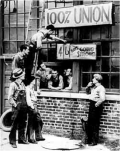It’s heartbreaking really, when a middle-age woman in the heart of the Midwest, who actually produces things for a living, says we just have to show the world that we aren’t thugs, we just want rights at our jobs. I mean she is wearing a Christmas sweater for goodness sake! It’s heartbreaking that anyone could call her a thug or that she could feel so beaten up by right-wing, corporate bullies that she feels the need to tell the world – she isn’t a “union thug”.
I have one the greatest jobs in the world – I spend the day listening and creating workshops for union members to practice talking to other workers about the power of working collectively. I really can’t imagine better work, than to spend the day with union members as we talk about power, class, and capitalism. (Even if we don’t always use all those words). I wish I had taken a picture of one of the groups’ drawings – circle of workers, linked hands, with words like job security, fair wages, health insurance, freedom from discrimination in the middle.
The last few days, I have had the honor to work with UAW members in Toledo, Ohio. Ohio was won by Obama because of workers such as them. They are not the faces of Occupy or typical lefty liberals. One of the best organizers there lost his only son to an IED blast in Afghanistan when he was 24 years old. This man organized his shop in the 80’s. He talks about the importance of democracy and rights on the job. The people in the room are a dying breed, they have worked in union shops their whole lives. They can’t imagine the precarious work that we have left for our children. They can take time off to care for sick children or elderly parents without worrying about being fired for it. They can stop working if they deem the equipment to be unsafe – without being fired for it. They know their seniority, their earned vacation days, their pension amount. When they go out to talk to unorganized workers – they are blown away by what the rest of us have grown accustomed to – the sheer, terrifying precariousness of modern day workplace.
They wouldn’t understand the choices of workers during Hurricane Sandy literally risked death because they knew they would be fired if the didn’t come to work in the hurricane. There were a lot of insightful articles following Hurricane Sandy about the economy of exploitation that undergirds the wealthy of Manhattan, the armies of low-wage workers that NYC expects to keep working for them through hurricanes and apocalypse. But few people pointed out that unions – workers organized – is a remedy to the unchecked, insatiable demands of capitalism.
I read an article in the NY Times that proposed unions would have to transform themselves into groups like Domestic Workers United, who successfully passed legislation to protect the rights of domestic workers. With all due respect to DWU – it is no substitution for a union and the ability to bargain and fight collectively for your economic interests. Domestic workers had to brave Sandy to go to work, legal rights on paper are little comfort when your employer tells you that you will be fired unless you come in. Union workers know that of they are terminated unjustly, they can go through their union to help them win their job back.
The house of Labor has taken a beating – that’s for sure, as “right to work” was rammed down our throats in Michigan, the heart of industrialized labor. Although, the governor was forced to sign the Act in the back alley because protestors blocked the front doors.
And as someone part of the Labor Movement for most of my working career, I recognize and critique our faults. Despite all the signs of our impending doom, we continue to rely on legislative and lobby efforts instead of mobilizing our members into a grass-roots movement. For sure, some of our members aren’t ready for civil disobedience – but undoubtedly some of them are. When the National Labor Relations Act was passed, big business fought it and swore never to abide by it. It took unions and specifically the UAW with its historic occupations of auto factories that actually made the law real. Labor unrest and working peoples’ sacrifice transformed America from sweatshops and child labor to a land of working-class jobs that provided a middle-class lifestyle. Autoworkers sending their children to college, Black middle class in Detroit – our ancestors before us through occupation and non-violent resistance won the rights we have today. Since becoming a lawyer, I realized that lawyers enforce the laws, but organizers make the law because organizers push the boundaries of the laws.
The members that sat in front of me in Toldeo, all said the same thing, that they were fighting for the future of their children. It is time for us to remember how we won rights for labor – through struggle in the streets. I hope to see labor out there in 2013, in the streets where we need to be.

